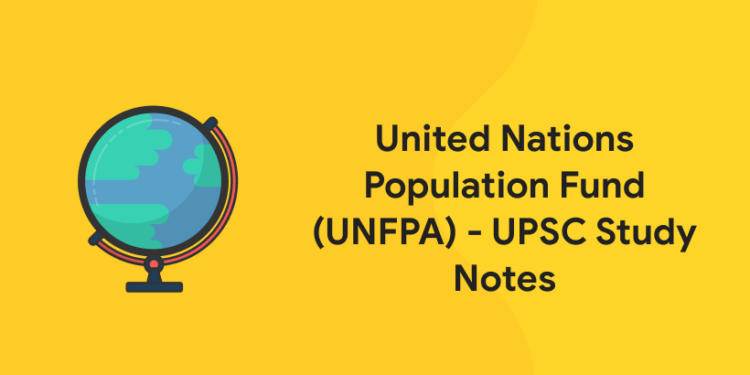Table of Contents
UNFPA formerly known as The United Nations Population Fund is an important programme under the United Nations. UNFPA is the United Nations sexual and reproductive health agency. Mission of UNFPA is to deliver a world where every pregnancy is wanted, every childbirth is safe and every young person’s potential is fulfilled.
In this article we will discuss the Formations, Goals, functions of UNFPA. International organizations and Programmes are important parts in the internal relation sections of the general studies subject in the UPSC syllabus. Aspirants preparing for Government exams would find the article very informative in preparation for UPSC and Other government examination.
| UNFPA Overview | |
| Organization | United Nations Population Fund |
| UNFPA Stands For | United Nation Fund for Population Activities |
| Headquartered | Newyork, USA |
| Year of Formation | 1967 |
| Sector | Health |
| Subsidiary Organ | UN General Assembly |
Formation of UNFPA
The United Nations Population Fund was established in 1967 as a trust fund in the United States. Its parent organization works as a subsidiary organ under the United Nations general assembly.
The organization was created in 1969, the same year the United Nations General Assembly declared “parents have the exclusive right to determine freely and responsibly the number and spacing of their children.
UNFPA stands for United Nations Fund for Population Activities. It was later renamed in 1987 to the United Nations Population Fund while retaining the UNFPA abbreviation.
Take free GK mock tests! Download Entri App!
UNFPA Goals
UNFPA mission is to deliver a world where every pregnancy is wanted, every childbirth is safe and every young person’s potential is fulfilled.
UNFPA has the mandate to boost awareness on population issues and to support strategies to address these. It also works to develop context-specific knowledge and capacity on population and reproductive health issues. The mandate of UNFPA is established by the United Nations Economic and Social Council (ECOSOC).
UNFPA works directly to tackle Sustainable Development Goal 3 on health, Goal 4 on education and Goal 5 on gender equality.
Objective of UNFPA
UNFPA works with governments and partners to promote universal access to quality, integrated sexual and reproductive health services. UNFPA also promotes comprehensive sexuality education and youth leadership, which empower young people to exercise autonomy, choice and participation with regard to their sexual and reproductive health and rights.
UNFPA World Population Report 2021
- Recently, the United Nations Population Fund’s (UNFPA) flagship State of World Population Report 2021 titled ‘My Body is My Own’ was launched.
- The State of World Population is an annual report. The United Nations Population Fund (UNFPA) publishes it.
- The focus of the Report: Bodily autonomy is the first time the focus of the report. Bodily autonomy is defined as the power and agency to make choices about your body without fear of violence or having someone else decide for you.
- The principle of bodily integrity sums up the right of each human being, including children, to autonomy and self-determination over their own body. It considers an unconsented physical intrusion as a human rights violation.
- While the principle has traditionally been raised in connection with practices such as torture, inhumane treatment and forced disappearance, bodily integrity has the potential to apply to wide range of human rights violations, which also affect children’s civil rights.
- Under its ambit also fall people with disabilities stripped of their rights to self-determination, to be free from violence and to enjoy a safe and satisfying sexual life.
- Examples of Violation of Bodily Autonomy: Some examples of violation of bodily autonomy include:
- child marriage
- female genital mutilation
- lack of contraceptive choices leading to unplanned pregnancy,
- unwanted sex exchanged for a home and food
- when people with diverse sexual orientations and gender identities cannot walk down a street without fear of assault or humiliation.
Key Finding of the Report
- Nearly half the women from 57 developing countries do not have the right to make decisions regarding their bodies. Decisions including using contraception, seeking healthcare, or even on their sexuality.
- Choices over Health Care: Only 55% of women are fully empowered to make choices over health care, contraception, and the ability to say yes or no to sex.
- Maternity Care: Only 71% of countries guarantee access to overall maternity care
- Access to Contraception: Only 75% of countries legally ensure full, equal access to contraception.
- Sexual health: Only about 80% of countries have laws supporting sexual health and well-being.
- Sexuality Education: Only about 56% of countries have laws and policies supporting comprehensive sexuality education.
United Nations Population Fund (UNFPA) and India
- According to the UNFPA reports, India will be the most populous country by the year 2028, although its fertility rate has declined from about 3.6 to 2.4 children in the last three decades.
- In India, according to NFHS-4 (2015-2016), only about 12% of currently married women (15-49 years of age) independently make decisions about their own healthcare.
- For a quarter of women (23%), it is the spouse that mainly takes decisions about healthcare.
- Information provided to women about use of contraception is also limited.
Take free GK mock tests! Download Entri App!
UNFPA Future
- Real, sustained progress largely depends on uprooting gender inequality and all forms of discrimination, and transforming the social and economic structures that maintain them.
- In this, men must become allies. Many more must commit to stepping away from patterns of privilege and dominance that profoundly undercut bodily autonomy, and move towards ways of living that are more fair and harmonious, benefiting all.
- Realizing bodily autonomy is essential to achieving the UNFPA’s goals of ending the global unmet need for contraception, preventable maternal deaths, gender-based violence and harmful practices by 2030.
Download Entri App, Entri provides you effective learnings in a period of time with the help of expert teams and you can accomplish the goal with the Entri App. We are providing you the best platform for the preparations for every prestigious exam. Here you can get access to a number of mock tests and get daily practice GK and Current affairs question series.














